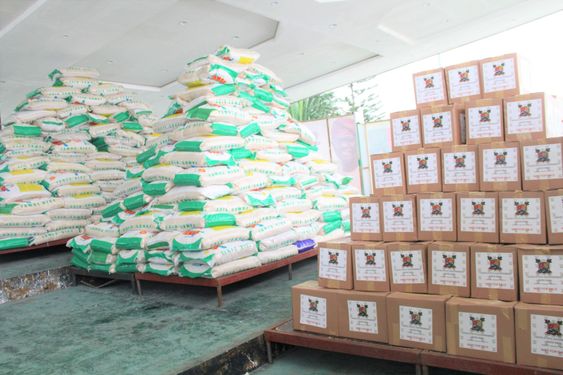Headlines
Removal of subsidies: Sanwo-Olu targets 500,000 needy households and identifies food aids

To lessen the impact of the elimination of fuel subsidies, Lagos State Governor Mr. Babajide Sanwo-Olu launched the distribution of food supplies for 500,000 poor households on Sunday.
The governor stated that the program’s strategic purpose was to provide staple foods to needy households in the state utilising two techniques while speaking at the exercise at the Lagos State House, Alausa, Ikeja.
According to him, under category one, groups will receive 100kg of beans, 50kg of Garri, and 50kg of rice in bulk.
He stated that households in category 2, which are particularly vulnerable, will receive food boxes including 10 kg of rice, 5 kg of garri, and 5 kg of beans.
As I stand before you all today, I am acutely aware of the difficulties that many Lagosians have been experiencing in light of the sharp increases in transport costs and the prices of basic food items throughout the state as a direct result of the Federal Government’s policy on the removal of fuel subsidies.
“As a responsive administration, we made a number of announcements intended to lessen the impact of the policy on our people, particularly the most vulnerable.
“These palliative measures, which are currently in place, include free prenatal care at government hospitals and a 50% cost cut for transportation on the government-owned bus system, among other things.
“The Lagos Food Bank Programme will be distributing food products to at-risk homes as one of the steps we announced and officially launched today.
“The strategic objective of this plan is to provide staple food items to 500,000 needy households in the state utilising two techniques, bulk and individual.
“Bulk food items include (50kg Rice, 50kg Garri, and 100kg Beans) for groups, and food boxes (10kg Rice, 5kg Garri, and 5kg Beans) for individual vulnerable households,” he stated.
A monitoring committee would be established, according to Sanwo-Olu, to ensure transparency in the implementation of this intervention.
He stated that members of the committee would be chosen from religious institutions, labour unions, handicapped individuals, civil society/non-governmental organisations, youth organisations, community development councils, and Lagos State House of Assembly delegates.
For convenience of the procedure, he stated that distribution would take place in stages among the many recipient groups.
The governor stated that each group would be properly informed of the date for collection in accordance with this arrangement.
“In total, this effort will have a direct impact on 500,000 benefiting households, more than 2,500 Micro, Small and Medium-Sized Enterprises (MSMEs) engaged in bag production, food aggregation, packaging, and shipping, and more than 25,000 MSMEs’ employees.
“I would want to take this opportunity to ask for the organisations and people with good intentions to sponsor this programme so that it can reach more of our people who need this intervention.
Be assured that sufficient precautions have been taken to guarantee that all donated things reach their intended recipients, he stated.
The governor stated that his administration is aware of the current economic difficulties.
He argues that the federal government’s current policies are challenging but essential steps that must be taken in order to put our economy back on the road of sustainable growth and prosperity for all residents.
“I am requesting everyone in Lagos’ continuous patience while assuring them that we would do everything in our power to put policies in place that will lessen this short-term suffering.
“We will continue to launch projects and activities that will improve our people’s lives and give everyone access to a high standard of living.
Some of the beneficiaries thanked the governor for helping to lessen the effects of the elimination of the fuel subsidies.
The governor was praised by Mrs. Josephine Babalola, vice chairperson of People Living with Disabilities, Lagos State Chapter, for his ongoing assistance to the physically disabled in the state.
An Islamic cleric named Alhaji Anifat-Amosa Babaniji praised the administration and urged it to do more to help the state’s struggling economy.
“I am quite pleased about it since it will benefit the less fortunate people much.
“Everyone is feeling the effects of fuel subsidies in general. Therefore, this is a positive development.
People would feel a little less pressure from the policy after this round of palliatives is over, he said.
Representatives of 18 groups reportedly collected their food palliatives, according to the News Agency of Nigeria (NAN).
Among them are the Nigeria Union of Journalists (NUJ), the Nigeria Labour Congress (NLC), religious organisations, and organisations for people with physical disabilities. (NAN)
